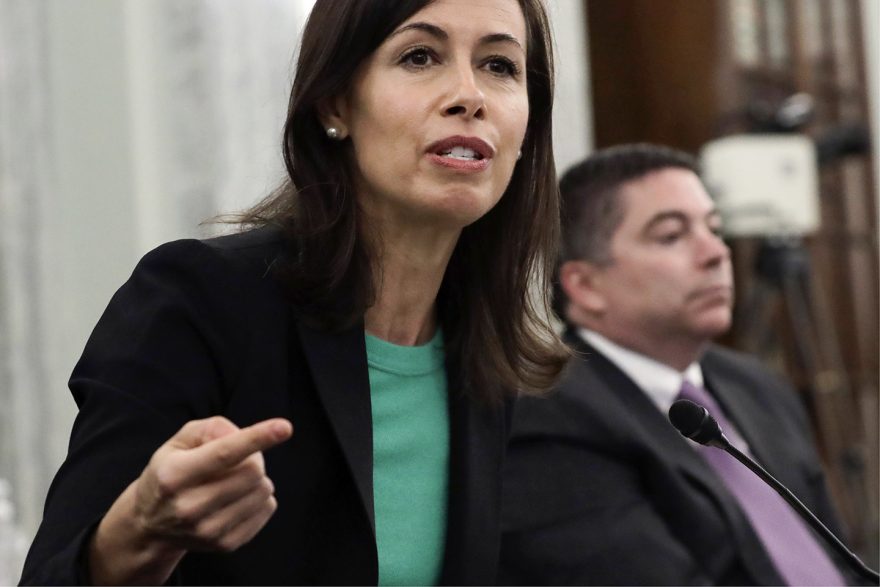FCC Votes to Reinstate Net Neutrality Protections, Reversing Trump-Era Changes

The Federal Communications Commission this week moved toward reinstating regulations designed to protect “net neutrality,” a step applauded by some school and advocacy organizations who see it as a step toward safeguarding educators’ access to online content.
Net neutrality is the principle that all content delivered via the web be treated equally by Internet service providers — rather than allowing those companies to deliver some materials at faster speeds, while throttling or blocking other content.
Support for regulation of broadband services by the FCC has flip-flopped over the last decade depending on the political party in office. Democratic party nominees to the agency have largely seen the measures as treating internet access as an essential service, while Republicans generally have argued it represents federal overreach and will restrict business innovation by internet service providers.
The measure passed Thursday on a 3-2 vote split along party lines.
This week’s vote is a reversal of steps taken to weaken the regulations in 2017, passed under Chairman Ajit Pai, President Donald Trump’s nominee.
It reinstates broadband services as subject to regulations under Title II of the Communications act — a return to the original “net neutrality” measures passed in 2015 by Chairman Tom Wheeler, a nominee of President Barack Obama.
“In the wake of the pandemic and the generational investment in internet access, we have a window to update our policies to make sure that the internet is not only open, but fast and fair, safe and secure,” said current FCC Chairwoman Jessica Rosenworcel in a statement. “I am committed to seizing this opportunity.”
This means internet providers are again prohibited from blocking or throttling content, the federal commission announced. It also gives them the ability to revoke the authorizations of foreign-owned entities who “pose a threat to national security” to operate broadband networks, and would allow the FCC to play an active role in outages that impact workers, businesses, or students.
Additionally, the FCC is also addressing longstanding Republican concerns. In its announcement, the commission says its vote “makes clear that the commission will exercise its authority over broadband in a narrowly tailored fashion—without rate regulation, tariffing, or unbundling—to foster continued innovation and investment.”
The FCC’s action is seen as a positive one for K-12 schools by some advocates, who maintained that the digital content that schools rely on might have been relegated to the “slow lane” if net neutrality protections were not maintained.
School and library officials feared that big-money content providers in the entertainment industry and other sectors could conceivably have paid more for access to deliver content via a “fast lane” to web users, while school-focused content — such as videos, games, and other digital learning options — may not.
Some ed-tech advocates had also maintained that the risk of slowing educational content delivery would stifle innovation among startup ed-tech providers, who would be less incentivized to create content if it was given second-class treatment.
The American Library Association is one organization that has advocated for these changes for years. The association shared its support for the vote on social media.
NEW: @FCC has voted to adopt #NetNeutrality guidelines!
ALA has long advocated for this change, which ALA Pres. Emily Drabinski said was “critical to our nation’s social, cultural, educational & economic well-being”: https://t.co/8hxSoI5zfV
Learn more: https://t.co/mREOleztqW
— American Library Association (@ALALibrary) April 25, 2024
“A world in which libraries and other noncommercial enterprises are limited to the internet’s ‘slow lanes’ while HD movies can obtain preferential treatment undermines a central priority for a democratic society” ALA President Emily Drabinski said in a statement.
“Citizens must be able to inform themselves and each other just as effectively as the major commercial and media interests inform them.”
Follow EdWeek Market Brief on Twitter @EdMarketBrief or connect with us on LinkedIn.
Photo: FCC Chair Jessica Rosenworcel speaks at a hearing on Capitol Hill in 2020. (Alex Wong/Pool via AP)
See also:
